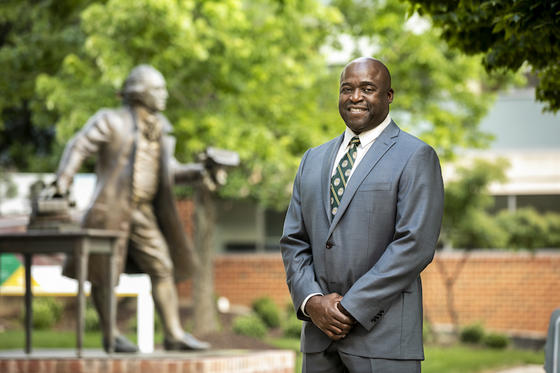In This Story
George Mason University President Gregory Washington has been elected into the National Academy of Engineering, the highest engineering honor in the country, the academy announced Tuesday.

Washington, who holds three mechanical engineering degrees, including his doctorate, from North Carolina State University, has held deanships at The Ohio State University and the University of California Irvine (UCI).
In electing Washington, the Washington, D.C.-based National Academy of Engineering cited his “advancement of technology at the interface of electromagnetics and materials, and dedicated leadership and service in engineering education.”
Washington was one of 106 new U.S. members elected to the academy Tuesday as announced by NAE President John L. Anderson. The newly elected class will be formally inducted at NAE’s annual meeting Oct. 1.
“I am tremendously honored to be elected into the National Academy of Engineering,” Washington said. “I proudly share this honor with the many mentors and colleagues at North Carolina State, Ohio State, UC Irvine and George Mason who have helped me along my journey.”
Among Washington’s main achievements in academia was extending the understanding of electromagnetic systems that incorporate smart materials and other active components in the emerging field of Smart Electromagnetic Structures (SEMS)—electromagnetic devices that are enhanced by the mechanical and electrical performance gains offered by smart materials. Washington is credited with one of the first uses of neural networks (machine learning) applied to electromagnetic systems.
As dean at UCI from 2011 to 2020, the first African American dean of engineering in the vast University of California system, Washington launched six research initiatives focused on helping faculty at all levels grow interdisciplinary research. These programs led to substantial growth in research expenditures and awards over a five-year period. Washington also led a multi-school team of faculty and administrators in establishing the Irvine Materials Research Institute, a $28 million research facility focused on materials characterization.
At both UCI and Ohio State, Washington instituted policies and procedures that led to the hiring of diverse faculty cohorts. Eight of 11 new hires at Ohio State and greater than 40% of his 58 new faculty hires at UCI were women or underrepresented minorities. Half of his department chairs at UCI were women and half of the associate deans were women or from underrepresented groups.
Washington developed global strategic relationships with key universities in Asia and U.S. multinational corporations and led in the establishment of a joint 3+2 program that allowed students from more than 14 universities to receive a BS from their institution and an MS from UCI simultaneously.
Washington founded and led the establishment of the American Society of Engineering Education (ASEE) Diversity Recognition Program, resulting in Inclusive Excellence Plans at institutions around the country. In addition, Washington established 17 new outreach and engagement initiatives for thousands of students and K-12 teachers in Southern California.
At both UCI and Ohio State, Washington developed and implemented initiatives to increase funded programs in interdisciplinary research. These included hiring of faculty along programmatic thrusts (not just departmental lines), hiring proposal coordinators, starting external proposal pre-submission review, and novel cost-share policies. He also led statewide economic development and engagement programs centered around advanced energy and manufacturing.
Washington has conducted research for National Science Foundation (NSF), NASA, General Motors, Boeing, HRL, Eaton Corp, the Air Force Research Laboratory, and the U.S. Army Research Office, among others and has served on many boards, including the U.S. Air Force Scientific Advisory Board, NSF Engineering Advisory Committee, Institute for Defense Analyses, the Sandia National Laboratory’s Engineering Science Research Foundation, and the National NIH Advisory Council for Biomedical Imaging and Bioengineering.
